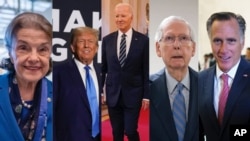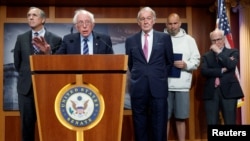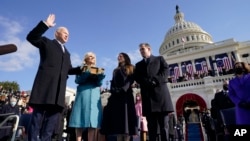All About America explores American culture, politics, trends, history, ideals and places of interest.
The median age of Americans is about 39 years old, but many of the country’s leaders, including some serving in the highest offices, are over the age of 60.
U.S. President Joe Biden is 80. Former president Donald Trump, the current front-runner for the 2024 Republican presidential nomination, is 77. The average age of U.S. senators is 64.
Health issues of some of the Senate’s oldest leaders made news recently. Minority Leader Mitch McConnell, 81, recently seemed to have two cognitive incidents in public where he appeared to freeze for about 30 seconds. Senator Dianne Feinstein, who died at 90 in September, was the Senate’s oldest member. Before her death, she suffered a string of health problems that led to an extended absence from the Senate.
“When it comes to politics, the challenge, of course, is that people like to have power and hold on to their power as long as possible,” says Sheldon Jacobson, a computer science professor at the University of Illinois Urbana Champaign, who has studied decision-making under uncertainty and risk assessment. “And I think human beings, in general, tend to delay decisions of that sort a little too long. We have trouble understanding and assessing risk when it comes to our own personal situation.”
How old is too old to lead? A 2022 poll showed that more than half of Americans, 58%, believe there should be a maximum age limit for elected officials, with 39% saying that limit should be age 70.
“Aging is not a one-size-fits-all phenomenon, and different people might have different strengths and weaknesses at different time periods of their life,” says Casey Brown, an assistant professor of psychology at Georgetown University who is on the steering committee for the university’s Center for Healthy Aging. “So, I don't think there's a simple answer to the question of how old is too old to lead.”
What science does tell us is that cognitive function begins to decline in early adulthood, she says.
“Typically, across the board, part of the normal aging process, there will be changes in certain aspects of cognitive functioning,” Brown says. “Different things in the realm of executive functioning might be the ability to use working memory. So, for example, keeping the number of things in mind at once and manipulating that information in your head can become more difficult. The amount of information that you can keep in mind at once tends to decline.”
Biden is the oldest U.S. president in American history. He was 78 at his 2021 inauguration. Trump, who was sworn at the age of 70 in 2017, is the second oldest, followed by Ronald Reagan, who was 69 when he became president. About 10% of people older than 70 have some level of dementia.
U.S. presidents must be at least 35 years old to serve. The minimum age requirement in the House of Representative is 25, and 30 for the Senate. There is no maximum age limit.
"If we look at President Biden's situation, if he gets reelected, he's going to be at an age which is basically an unprecedented zone in terms of the capability to be the president of the United States,” Jacobson says. “At the end of the day, voters are going to make that decision.”
Jacobson says trying to legislate a solution, such as setting an age limit for public officials, will be met with resistance. He says it would be ideal if older leaders would voluntarily step aside like Senator Mitt Romney, 76, who announced he will leave office in 2025 to make way for a “new generation” of leadership.
"It's time for guys like me to get out of the way," he told reporters in September.
The data shows that Americans are living longer. There were 89,739 people over the age of 100 in the U.S. in 2021, nearly twice as many as there were 20 years ago. Older people also tend to be healthier today than in previous generations, according to the National Institutes of Health, which finds that healthy habits can keep people active and healthy well into their 60s, 70s, and beyond.
Older people tend to lose a sense of purpose as they age, which might help explain why elected officials are sticking around well into their golden years.
“There's often a decline in feelings of purpose … and an involvement in society,” Brown says. “And so, maybe some of these highly intelligent older adults, who have made it to very high-status careers, maybe they've maintained their purpose, and they don't want to let it go.”






